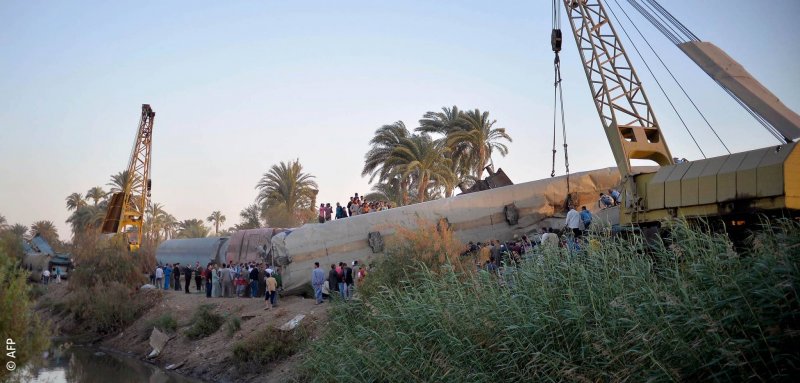Friday March 26, 2021, two trains collided in Sohag, Egypt resulting in at least 32 deaths and 100 injuries. The Egyptian Public Prosecution’s social media page stated shortly afterwards that the Public Prosecutor went to visit the scene, which was followed by the ordering of “some measures” in the investigations.
President Abdel Fattah el-Sisi stated on social media that he would see that the perpetrators of this “accident” get their punishment.
Who will get punished?
The people! The people will get punished for this “negligence . . . corruption . . . other.” Negligence and corruption were mentioned by the president in the context of the accident, the people themselves tried to resolve this negligence by acting on behalf of the state in the first instance, trying to help the people trapped inside who could be saved.
Sounds all too familiar? Two years ago, in February 2019, a train hit the platform, causing a fire that the passersby tried to put out with buckets of water before the firefighters arrived. 28 people died and 52 were injured. Investigations were open and the conductors arrested.
In 2018 – 12 died in a similar accident; in 2017, 41 people dead and 132 injured; . . . no need to go back annually to see the pattern.
Let’s go back to a haunting “accident” from the Hosni Mubarak era. The February 2002 ‘Ayat train accident that resulted in over 350 deaths when the conductor continued his journey for kilometers with the train on fire. Pictures and footage of the burnt bodies of the victims are carved in our collective memory as Egyptians.
This is not a memory of “accidents,” but memories of the negligence and corruption the Egyptian President referred to in his statement on this week’s train accident.
Here, I am just referring to train “accidents” but there were other accidents caused by lack of accountability and public spending.
Egyptians get punished for taking daily risks riding in ill-maintained transportation, while the ones responsible for these disasters sit pretty at home. The only ones held accountable are the conductors who are the least responsible for the killings.
Egyptians get punished for taking daily risks riding in ill-maintained transportation, while the ones responsible for these disasters sit pretty at home. The only ones held accountable are the conductors who are the least responsible for the killings.
In a journal article by Dalia Shabana published in 2018, she outlines how the Egyptian National Railway Authority (ENRA) as a public entity has been suffering from deteriorating losses. In 2013, this deterioration was further manifest with around 60 percent of train cars reaching their end-of-life. The number of employees is on the decline and their training is unreliable.
If public spending on the railway system is declining, then where does all the money go? How could the government afford to reconstruct the streets of Greater Cairo, build bridges and found a New Capital Project but not pay for the depreciating railway authority’s maintenance?
Should this question be even asked? Who dies in railway “accidents”, who died in the al-Salam Ferry in the 1990s?
These are not accidents. These are orchestrated acts of negligence and corruption that the people pay for in one way or another. The people who died in Sohag yesterday, and the train conductors who will be put on trial for incompetence, are the victims of state negligence.
These are not accidents. These are orchestrated acts of negligence and corruption that the people pay for. The people who died in #Sohag yesterday, and the train conductors who will be put on trial for incompetence, are the victims of state negligence.
The art of making a disaster and narrating it is of importance with this regard. The authorities are delegated to foresee how this disaster took place. Today, the President announces in the headlines that he is looking closely with investigators and authorities into the accident. Later on, the lives of those people long gone would be old news, brushed off the state’s “clean slate.” In a week’s time, the government would congratulate itself on the opening of some new project, bridge or road somewhere in Egypt. Meanwhile, the people wait for the disaster in the making by the permanent lack of accountability and negligence.
Tomorrow, we, the people, venture once more with our lives, conscious that in carrying on despite of all this is an act of rebellion.
*S. Tonsy is Associate Researcher at the IREMAM, and Mesopolhis, Institut d’études politiques, Aix-en-Provence, France.
*The views and opinions expressed in this article are those of the author and do not necessarily reflect Raseef22
Raseef22 is a not for profit entity. Our focus is on quality journalism. Every contribution to the NasRaseef membership goes directly towards journalism production. We stand independent, not accepting corporate sponsorships, sponsored content or political funding.
Support our mission to keep Raseef22 available to all readers by clicking here!
Interested in writing with us? Check our pitch process here!



